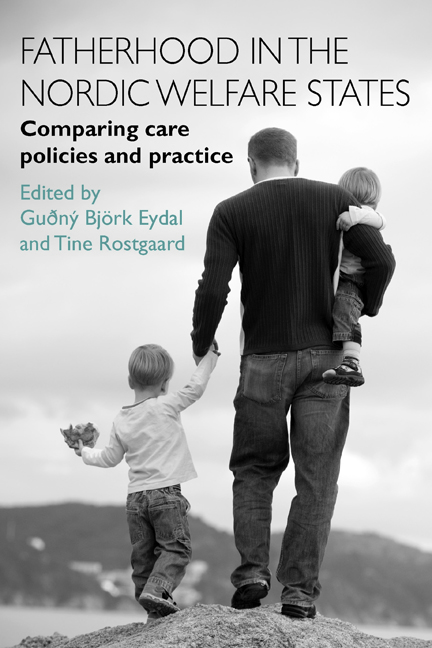Book contents
- Frontmatter
- Contents
- List of tables and figures
- Notes on contributors
- Acknowledgements
- one Introduction
- Theme 1 Fathers, families and family policies
- Theme 2 Fathers in everyday life – culture, work and care
- Theme 3 Constructing fatherhood in different family settings
- Theme 4 Caring fathers and paid parental leave policies
- Theme 5 International reflections on findings
- Conclusions
- Index
two - Fathering: the influence of ideational factors for male fertility behaviour
Published online by Cambridge University Press: 04 March 2022
- Frontmatter
- Contents
- List of tables and figures
- Notes on contributors
- Acknowledgements
- one Introduction
- Theme 1 Fathers, families and family policies
- Theme 2 Fathers in everyday life – culture, work and care
- Theme 3 Constructing fatherhood in different family settings
- Theme 4 Caring fathers and paid parental leave policies
- Theme 5 International reflections on findings
- Conclusions
- Index
Summary
Introduction
The falling number of children being born is a concern throughout Europe, with total fertility rates well below the reproduction rate of 2.1 children per woman in every country. Some see this failure of the population to reproduce itself as a crisis at the very foundations of European society (European Foundation, 2004). With the three major demographic trends of fertility decline, increased family diversity and ageing societies looming, ‘demographic renewal’ has therefore become a key impetus for several European governments (Commission of the European Union, 2005; O’Brien and Moss, 2010).
Demographic analyses argue that the low fertility rates are not due to less desire to have at least one child (Kohler et al, 2002), but rather the postponement of fertility from early to later adulthood, implying lower overall fertility (Kohler et al, 2006; Billari and Borgoni, 2005). The postponement transition towards late childbearing regimes is believed to be a common pattern characterising many European countries, and a phenomenon which is seen as a further step in a long-term transformation of fertility and related behaviours (Kohler et al, 2002).
Postponing the first child therefore, in accordance with the theory of postponement, is generally considered to be a most important event in what has been labelled the ‘second demographic transition’ (van de Kaa, 1987) in that the postponement of fertility not only leads to delayed childbearing patterns, but also has a negative affect on the number of children born and thus the completed fertility. The increase in the mean age of first-birth mothers is often used to characterise this phenomenon, with an average increase in OECD countries from 23.8 to 27.2 years for mothers for the timing of first birth in the years 1970-2000 (d’Addio and d’Ercole, 2005). Important factors for this increase in the age of first childbirth include changes in women's education, employment patterns and career orientation (Martin, 2000; Gustafsson, 2001).
However, it is increasingly recognised in accordance with the theory of planned behaviour that men's – just as women's – childbearing desires and intentions influence the birth rate, and with equal force (Thomson and Hoem, 1998), just as there is also a discrepancy between men's desired number of children (2.39 at age 55+, EU25; European Commission, 2006) and their realised number of children (2.11 at age 55, EU25; European Commission, 2006).
- Type
- Chapter
- Information
- Fatherhood in the Nordic Welfare StatesComparing Care Policies and Practice, pp. 23 - 52Publisher: Bristol University PressPrint publication year: 2014



